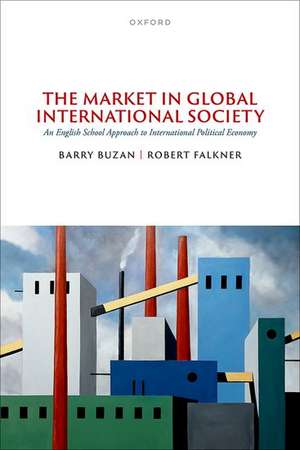The Market in Global International Society: An English School Approach to International Political Economy
Autor Barry Buzan, Robert Falkneren Limba Engleză Hardback – 6 ian 2025
Preț: 594.57 lei
Preț vechi: 851.28 lei
-30% Nou
Puncte Express: 892
Preț estimativ în valută:
113.77€ • 121.66$ • 94.86£
113.77€ • 121.66$ • 94.86£
Carte disponibilă
Livrare economică 17-24 martie
Preluare comenzi: 021 569.72.76
Specificații
ISBN-13: 9780198938842
ISBN-10: 0198938845
Pagini: 320
Dimensiuni: 165 x 242 x 24 mm
Greutate: 0.63 kg
Editura: OUP OXFORD
Colecția OUP Oxford
Locul publicării:Oxford, United Kingdom
ISBN-10: 0198938845
Pagini: 320
Dimensiuni: 165 x 242 x 24 mm
Greutate: 0.63 kg
Editura: OUP OXFORD
Colecția OUP Oxford
Locul publicării:Oxford, United Kingdom
Recenzii
In this compelling book, Buzan and Falkner do more than develop an innovative English school approach to IPE. They also make a major contribution to the much-needed rebuilding of big-picture thinking in IPE through their sweeping, deep history of the role of the market in international economic governance. Highly recommended!
In this ambitious book, the authors prove that crossing disciplinary boundaries can yield important insights and stimulate innovative research. Scholars associated with the English School of international relations have long combined history and philosophy to underpin a distinctive understanding of the political dynamics of international and global societies. Buzan and Falkner convincingly demonstrate here that bringing a rigorous treatment of the market-as place, structure, and governing principle--into the conversation is both overdue and enlightening. In doing so, they strengthen vital links between the fields of international relations and international political economy.
This is a seminal book that IPE scholars need take note of as it introduces the sub-discipline to the English School; a theory that can now be added to the growing menu of IPE theories. Simultaneously, in elevating the market to a 'primary institution' of international society, Buzan and Falkner provide an irrefutable set of reasons as to why English School scholars can no longer treat international political institutions as separate to the economics of the market. In the process, this book brilliantly reconfigures the way that the theory understands the usual list of international political institutions and how these operate and interact in ways that have not been considered before.
Buzan and Falkner have produced stunning insights, not just on the dyadic nature of the market, but on all primary institutions. The idea that they have an historical presence, that they can fluctuate, from being “powerful structuring influences”, to being marginalized and widely opposed, throws light not just on the market, but on all primary institutions, including the state. Vindicating the claim, first put forward by Mayall, that primary institutions can be contested, they bring the English School into an historical dialogue with itself.
Buzan and Falkner demonstrate compellingly that their English School approach should lead us to rethink how we understand the evolution of the global political economy. Their new book points to ways in which the current divide between IR and IPE might be bridged.
In this ambitious book, the authors prove that crossing disciplinary boundaries can yield important insights and stimulate innovative research. Scholars associated with the English School of international relations have long combined history and philosophy to underpin a distinctive understanding of the political dynamics of international and global societies. Buzan and Falkner convincingly demonstrate here that bringing a rigorous treatment of the market-as place, structure, and governing principle--into the conversation is both overdue and enlightening. In doing so, they strengthen vital links between the fields of international relations and international political economy.
This is a seminal book that IPE scholars need take note of as it introduces the sub-discipline to the English School; a theory that can now be added to the growing menu of IPE theories. Simultaneously, in elevating the market to a 'primary institution' of international society, Buzan and Falkner provide an irrefutable set of reasons as to why English School scholars can no longer treat international political institutions as separate to the economics of the market. In the process, this book brilliantly reconfigures the way that the theory understands the usual list of international political institutions and how these operate and interact in ways that have not been considered before.
Buzan and Falkner have produced stunning insights, not just on the dyadic nature of the market, but on all primary institutions. The idea that they have an historical presence, that they can fluctuate, from being “powerful structuring influences”, to being marginalized and widely opposed, throws light not just on the market, but on all primary institutions, including the state. Vindicating the claim, first put forward by Mayall, that primary institutions can be contested, they bring the English School into an historical dialogue with itself.
Buzan and Falkner demonstrate compellingly that their English School approach should lead us to rethink how we understand the evolution of the global political economy. Their new book points to ways in which the current divide between IR and IPE might be bridged.
Notă biografică
Barry Buzan is a Fellow of the British Academy, Emeritus Professor in the London School of Economics and Political Science (LSE) Department of International Relations, and a Senior Fellow at LSE IDEAS. He was formerly Montague Burton Professor in the Department of International Relations, LSE. He is the author of Rethinking Sino-Japanese Alienation, with Evelyn Goh, and Making Global Society: A Study of Humankind Across Three Eras.Robert Falkner is Professor of International Relations at the London School of Economics and Political Science (LSE), where he serves as the Academic Dean of the TRIUM Global EMBA, an alliance between NYU Stern, LSE, and HEC Paris. He is currently a Distinguished Fellow at the University of Toronto's Munk School of Global Affairs and Public Policy. He is the author of Environmentalism and Global International Society and co-editor of Great Powers, Climate Change, and Global Environmental Responsibilities.
